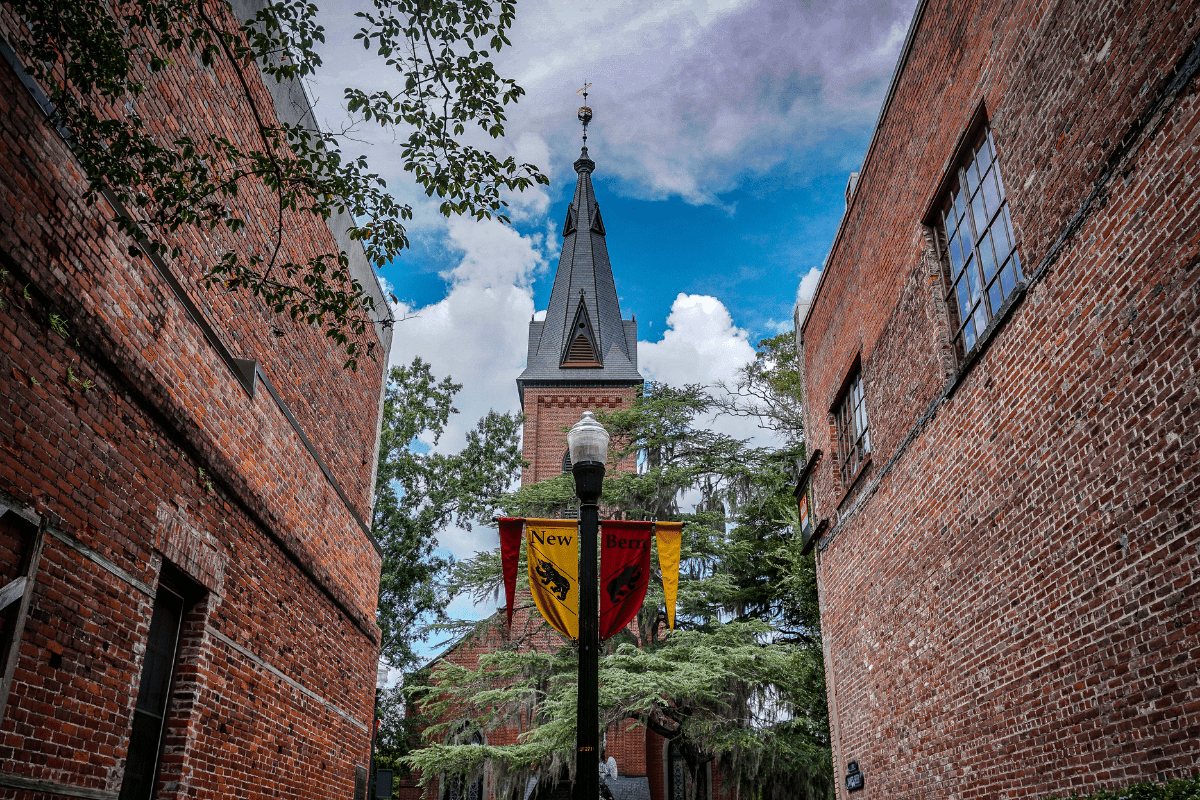North Carolina offers families an exceptional combination of top-ranked schools, growing job markets, and diverse living environments from mountains to coast. Based on comprehensive 2024 data, Cary consistently ranks as the #1 city for families in North Carolina, with its Wake County school system, crime rate of just 14 per 1,000 residents, and median household income of $129,688.
The Triangle Takes the Crown (And Most of the Top 10)
The Research Triangle region dominates family-friendly rankings with such consistency that other cities might want to file a complaint. Eight of the top ten spots in WalletHub's 2024 family rankings belong to Triangle communities, with Cary leading at a total score of 75.87, followed by Davidson (75.46) and Morrisville (74.77).
These communities share access to Wake County Public Schools, North Carolina's largest and top-performing district with 159,778 students across 196 schools and graduation rates exceeding 89%. The proximity to Research Triangle Park, home to over 200 companies, creates an employment ecosystem where average wages reach $35.39 per hour in the Durham-Chapel Hill metro. Yes, that supports the region's higher housing costs, but at least you're not paying Silicon Valley prices for a studio apartment.
Cary: Where Perfection Gets Slightly Annoying
Cary earns its #1 ranking through what appears to be an unfair accumulation of advantages. The city ranks as the 18th safest nationally, maintains pristine parks that make other towns jealous, and somehow manages to keep everyone employed and happy.
One current resident captures the Cary experience: "The town's beauty, with its lush greenery and well-maintained parks like Bond Park and Hemlock Bluffs, creates a peaceful environment. The people are incredibly friendly, and the neighborhoods are safe." Translation: your biggest worry might be whether your lawn meets neighborhood standards.
The numbers back up the hype:
- Crime rate: 14 per 1,000 residents
- Median household income: $129,688
- School ratings consistently exceed state averages
- Access to RTP's tech jobs
- Parks that actually get maintained
Apex Lives Up to Its "Peak" Nickname
Apex takes the family-friendly competition seriously, boasting the highest concentration of households with children at 46.8%. Apparently, once families move here, they immediately start reproducing to fill all those excellent schools.
The median home price of $591,542 might induce sticker shock, but residents find value in the 22-minute average commute and housing costs that consume only 17% of income. The Town of Apex provides extensive recreation programs, and downtown maintains that small-town charm while offering actual restaurants that aren't chains. Revolutionary concept, really.
Holly Springs: Where Growth Happens Fast
Holly Springs exemplifies North Carolina's growth story, exploding from 8,000 to 42,023 residents faster than you can say "traffic impact study." Despite this growth, the town maintains the lowest crime rate in the region at 7.3 per 1,000 residents.
Key Holly Springs advantages:
- HURRAHS recreation program (yes, that's really the name)
- Better Sports designation for youth athletics
- New schools opening regularly
- Median home price: $550,787
- Actual downtown developing
Chapel Hill: Where Everyone Has a Graduate Degree
Chapel Hill offers a different Triangle experience, combining the state's highest SAT scores with a vibrant university atmosphere. The 78% adult education rate means your book club discussions might get intense.
Median home prices reach $600,000-$669,000, but families value the educational environment and UNC's cultural programming. The Morehead Planetarium and Carolina Basketball Museum provide educational opportunities, though explaining why basketball matters so much in North Carolina requires its own article.
Charlotte: Big City Amenities, Suburban Refuges
Charlotte proper presents challenges with crime rates of 46 per 1,000 residents, double the national average. However, declaring Charlotte unsuitable for families ignores its exceptional suburban communities and economic advantages.
The Charlotte metro leads North Carolina with average hourly wages of $35.93, supported by its position as the nation's second-largest banking center. Levine Children's Hospital ranks #1 in North Carolina and earned national recognition in 10 pediatric specialties. The city's 210 parks covering 17,600 acres include extensive youth sports leagues and 27 recreation centers.
The Suburban Sweet Spots
Mooresville earned recognition as America's fastest-growing suburb, with 30% population growth between 2020-2022. Located 14 miles north of Charlotte with Lake Norman access, the median home price of $549,990 reflects this popularity. Race fans appreciate the NASCAR connection, while everyone else enjoys the lake life without coastal hurricane worries.
Matthews and Huntersville provide established suburban options with median household incomes exceeding $119,000 and significantly lower crime rates than Charlotte's urban core. Concord stands out for scale, with 113,371 residents maintaining a family-friendly atmosphere and 37.2% of households having children. The median home price of $361,879 makes it more accessible than other Charlotte suburbs.
Top Charlotte-area suburbs for families:
- Ballantyne: Safe, expensive, good schools
- Myers Park: Historic charm, tree-lined streets
- Waxhaw: Small-town feel, growing fast
- Fort Mill (SC): Just across border, no state income tax
- Indian Trail: Affordable, family-focused
Mountain Living Without the Colorado Price Tag
Western North Carolina's mountain region provides exceptional outdoor access with distinct trade-offs. Asheville leads with comprehensive services but faces housing challenges, with median prices reaching $507,000 and over 3,000 short-term rentals affecting inventory. Tourists love it, residents trying to buy homes… not so much.
Buncombe County Schools earn an A- grade ranking #14 statewide, and Mission Children's Hospital provides the region's only full-service pediatric facility. The area offers 250+ nearby waterfalls and Blue Ridge Parkway access, though explaining to your kids why they can't swim in every waterfall gets exhausting.
More Affordable Mountain Options
Hendersonville emerges as a practical mountain choice with median home prices around $420,000 and crime rates 85.3% of the national average. Known as the "City of Four Seasons," it combines apple orchards, proximity to DuPont State Forest, and excellent schools. The 36.3% housing inventory growth means you might actually find a house to buy.
Boone's university town dynamics create unique considerations. Appalachian State University enriches educational opportunities but drives housing competition, with median prices around $430,000. Families benefit from excellent winter sports access, though teenage snowboarders might never want to leave the slopes for school.
Smaller mountain communities worth considering:
- Brevard: Population 7,744, waterfall capital
- Black Mountain: Artsy, affordable, good coffee
- Marion: Most budget-friendly option
- Waynesville: Gateway to Smokies
- Sylva: Small but growing
Coastal Living: Beaches, Breaches, and Budget Considerations
Eastern North Carolina's coastal communities require families to weigh beach lifestyle benefits against hurricane risks and insurance costs. It's basically a math problem involving sand castles and storm surge probabilities.
Wilmington's New Hanover County Schools include six A-rated schools, but the city faces higher crime rates and 31% of properties at severe flood risk. Median home prices of $480,000 reflect coastal premiums, while hurricane insurance adds substantial costs with typical deductibles reaching 2% of dwelling coverage.
Military Families: Jacksonville's Unique Ecosystem
Jacksonville serves military families through Camp Lejeune's 40,000+ Marines, offering specialized support systems civilian communities can't match. The 91.1% graduation rate in Onslow County Schools reflects strong educational commitment despite high population turnover. On-base housing and Basic Allowance for Housing offset costs, though finding consistent playmates for kids proves challenging with frequent deployments.
The Inland Coastal Compromise
Greenville leverages East Carolina University's presence, with 28,000+ students supporting cultural amenities. Located 1.5-2 hours from beaches, it offers university town benefits without coastal insurance premiums. The ECU medical center provides regional healthcare leadership, particularly important for families with specialized medical needs.
The Southern Pines/Pinehurst area presents an interesting alternative, with Pinehurst recording just 4 crimes per 1,000 residents. The golf-centric culture means your kids might develop excellent hand-eye coordination or expensive hobbies. Located 2-3 hours from beaches, it provides occasional coastal access without hurricane evacuation drills.
Making Sense of the Rankings
Professional assessments consistently favor Triangle communities, with Niche ranking Cary, Apex, and Morrisville as the top three family cities statewide. U.S. News placed Raleigh #3 nationally for quality of life, citing the convergence of three major universities creating an "epicenter of higher education."
Migration patterns reinforce these rankings. North Carolina attracted 110,800 new residents in 2023, making it the third-highest destination nationally. Remote work drives much of this growth, with over 10% of Triangle job postings now offering remote options. As one analyst noted, there's "less pull to being in or near a big city because of remote work. North Carolina has been a big winner."
The state's housing market reflects this demand, with median prices reaching $373,200 and 7.5% appreciation forecast for 2025. However, inventory improvements in select markets provide opportunities for prepared buyers. Just don't expect to lowball offers in Cary.
Your Priority, Your City
Choosing the best city depends entirely on your family's priorities, budget, and tolerance for either traffic or tourists.
Safety-first families should focus on Cary (#18 safest nationally), Holly Springs (7.3 crimes per 1,000), or Pinehurst (top 4% safest). These communities prove that low crime rates and family amenities aren't mutually exclusive.
Education enthusiasts find paradise in Chapel Hill-Carrboro schools ranking #1 statewide, while Wake County's size provides extensive program options from language immersion to STEM specialties. Just prepare for competitive parent involvement.
Budget-conscious families discover value in Greensboro (15.8% below national cost of living), Durham (1.2% below national average), or Marion in the mountains. These cities prove you don't need six figures to access good schools and safe neighborhoods.
Outdoor adventure seekers gravitate toward Asheville's 250+ waterfalls and Blue Ridge Parkway access, though housing costs require sacrifice. Brevard and Black Mountain offer similar mountain benefits at lower prices, minus some amenities.
Healthcare priorities point toward Charlotte's Levine Children's Hospital, Durham's Duke Children's, or the Triangle's UNC Children's Hospital. When your kid inevitably attempts something physics suggests is impossible, you'll appreciate nearby pediatric specialists.
Career climbers target Charlotte's financial sector paying $35.93 hourly average, Research Triangle Park's tech ecosystem, or Greenville's growing medical industry. The NC Commerce website provides comprehensive job search resources across regions.
The North Carolina Advantage
North Carolina succeeds by offering genuine variety across educational excellence, economic opportunity, and lifestyle preferences. The Triangle region's dominance in rankings reflects exceptional schools, job markets, and planned growth, but families find equal success in Charlotte's suburbs, mountain communities, and selective coastal areas.
Housing costs remain significantly below comparable metros nationally, while strong job growth and consistent quality of life recognition continue attracting families. Whether prioritizing Cary's almost-annoying perfection, Asheville's mountain culture, or Wilmington's beach access despite hurricane roulette, families can find communities matching their specific needs.
The state's growth shows no signs of slowing, with remote work flexibility expanding housing options beyond traditional commuting distances. Just remember: in North Carolina, you'll need to pick a basketball team, learn to appreciate barbecue debates, and accept that everyone will have opinions about your city choice. Welcome to the family.





